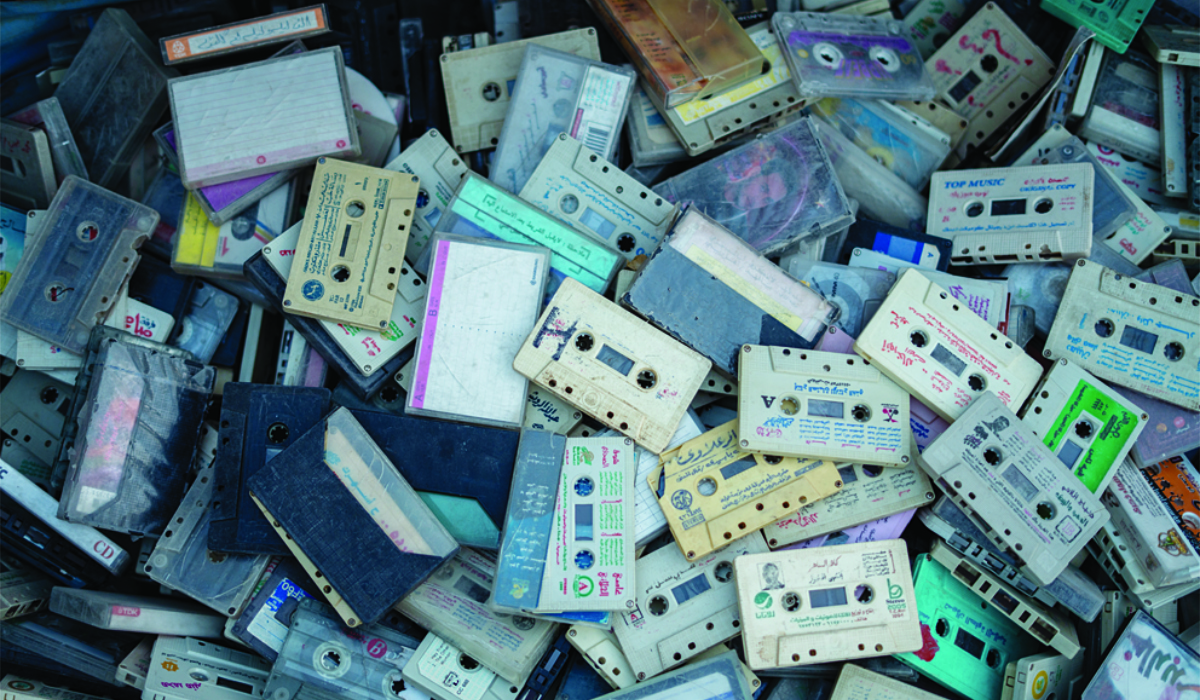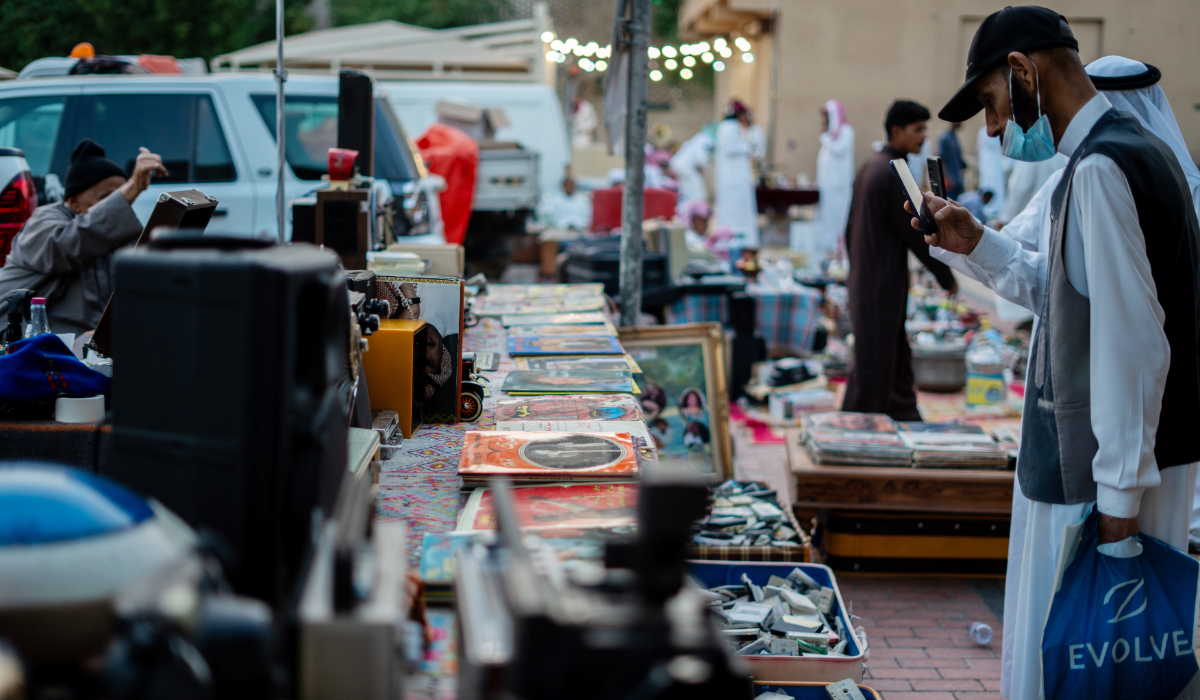RIYADH: In Riyadh’s bustling Souq Al-Zal the air is filled with the scent of spices, vibrant colors of traditional goods, and the echo of timeless melodies.
Amid the stalls of woven rugs and antiques, Abu Radah’s corner stands out. Known for his collection of records and cassettes, and his boundless passion for folk music, he has become a beloved figure in the market, sharing his love for vintage sounds with locals and tourists alike.

Rows of old-school cassette tapes evoke memories of simpler times, a reminder of the analog age preserved at Abu Radah’s stall in Souq Al-Zal. (AN photos by Abdulrhman Bin Shalhoub)
“I work with folk art. It’s my passion,” he told Arab News. “I love folk art; artists like Fahd Al-Saeed, Bashir Shannan, Essa, Taher, and all the folk artists, including Mohammed Abdu and Talal, all Khaleeji and non-Khaleeji music.”
For over two decades, Abu Radah has nurtured this passion, turning it into a collection that speaks to the soul of Saudi Arabia’s musical heritage.
HIGHLIGHTS
• Videos of Abu Radah spinning vinyl records and inviting visitors to dance have gone viral, bringing a new wave of attention to his humble stall.
• His corner is not just a place to buy records, but a place to experience a piece of Saudi history.
His stall, adorned with colorful rugs and surrounded by retro radios and speakers, is a treasure trove of music that resonates with Saudi heritage. “Honestly, I’ve been passionate about it since I was young. I started collecting records when I was around 17 or 18,” he said. “I used to get them from Abu Wahib, may he rest in peace, in Helat Al-Ahrar.

Abu Radah’s stall showcases a vibrant collection of vintage radios and speakers, inviting passersby to explore Saudi Arabia’s musical history. (AN photos by Abdulrhman Bin Shalhoub)
“Little by little, I collected records, tapes, silencing devices, recorders, musical scales, and classic recordings. It became a hobby and a routine for me, thank God.”
Visitors to Abu Radah’s stall can explore everything from rare vinyl records to cassette tapes, all carefully organized across tables covered in colorful textiles. “(I have) some rare records, like Bashir Shannan’s album ‘Al-Barih Yom Aindak.’ It’s hard to find, as well as the classic Fahd Al-Saeed records. These are collector’s items,” he says with pride.

A selection of vinyl records featuring classic Western artists, demonstrating Abu Radah’s diverse collection that appeals to both local enthusiasts and tourists. (AN photos by Abdulrhman Bin Shalhoub)
His dedication to preserving this musical heritage has made his stall a magnet for enthusiasts.
“Honestly, Bashir Shannan, may he rest in peace. He’s my favorite artist,” Abu Radah added, reflecting on his connection to the music.
His collection also includes international names. “I have records of Michael Jackson and other international artists. I got them because we receive tourists, and some might prefer non-Arabic music.”

A visitor inspects a vinyl record at Abu Radah’s stall, capturing a moment of nostalgia amidst the treasures of Riyadh’s Carpet Market (Souq Al-Zal). (AN photos by Abdulrhman Bin Shalhoub)
This blend of local and international records makes his stall a fascinating stop for tourists. “Tourists enjoy it here. We even had an American tourist who loved it when I played a Michael Jackson record, and it became a trending moment,” Abu Radah recalls with a smile.
Souq Al-Zal, known for its antique treasures and traditional crafts, has evolved in recent years, attracting a new generation eager to reconnect with their roots. Social media, particularly TikTok, has played a surprising role in this resurgence.
Videos of Abu Radah spinning vinyl records and inviting visitors to dance have gone viral, bringing a new wave of attention to his humble stall. Young Saudis and international tourists now flock to the market, eager to meet the man behind the music and experience his one-of-a-kind collection.
Abdullah Al-Sheqair, known as Shalgm, is another familiar face in the market who has spent eight to ten years there.
Shalgm admires how the market has evolved, crediting social media and the country’s leadership for revitalizing heritage. “Social media has boosted the market, and Crown Prince Mohammed bin Salman’s vision has rejuvenated heritage. Previously, items like traditional coffee pots sold for little, but now they have high value. Back then, only the elderly were in this trade, but now both youth and elders are involved.”
According to Shalgm, the number of tourists has increased significantly, bringing fresh energy to the market. “Now, we have an increasing number of tourists visiting. They participate in auctions and enjoy the music with Abu Radah. Everyone’s happy,” he said.
Shalgm also holds a deep admiration for Abu Radah’s dedication to music. “Speaking of Abu Radah, he’s been a fan of Bashir for over 20 years … he is one of the nicest people in the market, even kinder than I am,” Shalgm added, highlighting Radah’s well-known generosity and warmth.
As the day winds down in Souq Al-Zal, the sound of Abu Radah’s records continues to echo through the market, creating an atmosphere where music bridges generations and cultures.
For those who pass by his stall, it is not just a place to buy records, but a place to experience a piece of Saudi history, brought to life by a man whose love for music is as timeless as the records he cherishes.





























